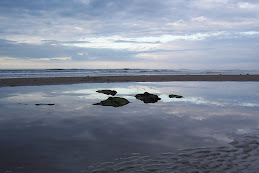How to get started writing? It’s no secret that I am a great advocate of what I call ‘free’ writing. Free writing throws off any inflexible rules about how writing ought to look or about what it ought to say. I call it free writing. Others have described it in different ways, such as unconscious or automatic writing where we write whatever is in our heads in as muddled up or disorderly fashion as possible. From this ‘mess’ can be drawn words or phrases which are often surprising and can be the springboard for further, more crafted, writing.
Natalie Goldberg in her seminal work Writing Down the Bones, gives the following 'rules' for free writing: keep to a time limit*; keep your hand moving; don't cross out; don't worry about spelling, punctuation, grammar; lose control; don't think; don't get logical; go for the jugular (if something comes up in your writing that is scary or naked, dive right into it. It probably has lots of energy)
* I would suggest initially three minutes, working up to five or ten.
The aim is to 'burn through to first thoughts … to the place where you are writing what your mind actually sees and feels, not what it thinks it should see or feel', to 'explore the rugged edge of thought.' (Goldberg, p8/9)
This does take practice and may initially go against the writing instinct, especially if you have a particularly rigid attitude to writing taken from certain experiences in the past, school for instance.
Surrealists used free writing before they painted and I introduced it to a local artist, John Bell. He has recently sent me this wonderful painting which expresses for him the process of ‘free’ writing.

John explains: I just thought you may like to see the attached picture entitled ‘Golden Thread’. It is about free writing; it reads left to right. The upper horizontal line represents thoughts we are aware of, but there's lots going on beneath.
Tracing free writing along this upper line gives a peak to represent a gold nugget dredged to the surface. This, tracing further, gives an opportunity to be enlightened by this revelation, and a realisation of more, perhaps even larger ‘nuggets’ to uncover later.
(For more information about John's art, contact:johnrbell52@hotmail.com
So this Summer, set your writerly hand free and discover the treasure just below the surface.

 John explains: I just thought you may like to see the attached picture entitled ‘Golden Thread’. It is about free writing; it reads left to right. The upper horizontal line represents thoughts we are aware of, but there's lots going on beneath.
John explains: I just thought you may like to see the attached picture entitled ‘Golden Thread’. It is about free writing; it reads left to right. The upper horizontal line represents thoughts we are aware of, but there's lots going on beneath. 